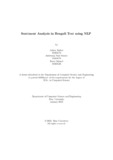| dc.contributor.advisor | Shakil, Mr. Arif | |
| dc.contributor.advisor | Sadeque, Dr. Farig Yousuf | |
| dc.contributor.author | Sarkar, Ankon | |
| dc.contributor.author | Sourav, Aishwarja Paul | |
| dc.contributor.author | Ahmed, Rezvi | |
| dc.date.accessioned | 2023-07-30T07:27:02Z | |
| dc.date.available | 2023-07-30T07:27:02Z | |
| dc.date.copyright | 2023 | |
| dc.date.issued | 2023-01 | |
| dc.identifier.other | ID: 18301273 | |
| dc.identifier.other | ID: 18301078 | |
| dc.identifier.other | ID: 18301226 | |
| dc.identifier.uri | http://hdl.handle.net/10361/19148 | |
| dc.description | This thesis is submitted in partial fulfillment of the requirements for the degree of Bachelor of Science in Computer Science, 2023. | en_US |
| dc.description | Cataloged from PDF version of thesis. | |
| dc.description | Includes bibliographical references (pages 34-36). | |
| dc.description.abstract | Natural Language Processing, a branch of AI, teaches computers to understand
speech and text in multiple languages. Machine learning or deep learning techniques
can be used to develop rule-based models of human-spoken languages to simulate
accurate text-meaning predictions. Although many studies have vastly improved
the categorization of text data in languages such as English, Arabic, Chinese, Urdu,
Hindi, etc, Bengali text categorization has not progressed much compared to oth ers. This research proposes an approach to analyzing and extracting basic emotions
(Happiness, Sadness, Fear, Anger, Disgust Surprise) from Bengali text data. This
can be done by gathering real-life data and producing a special rule-based algorithm
using supervised machine learning and deep learning techniques. We evaluate the
performance of our models using our own dataset BANEmo, consisting of 14999
annotated Bengali text data. To make text data machine-readable, we employed
Bag of words, TF-IDF, Glove, and BERT embedding. We measured performance
using supervised machine learning models like Naive Bayes and Support Vector Ma chine. Deep learning techniques like LSTM and Transformers (BERT) were also
implemented. Our BERT model outperformed others with an overall accuracy of
69.2%. | en_US |
| dc.description.statementofresponsibility | Ankon Sarkar | |
| dc.description.statementofresponsibility | Aishwarja Paul Sourav | |
| dc.description.statementofresponsibility | Rezvi Ahmed | |
| dc.format.extent | 36 pages | |
| dc.language.iso | en | en_US |
| dc.publisher | Brac University | en_US |
| dc.rights | Brac University theses are protected by copyright. They may be viewed from this source for any purpose, but reproduction or distribution in any format is prohibited without written permission. | |
| dc.subject | Natural language processing | en_US |
| dc.subject | Sentiment analysis | en_US |
| dc.subject | Bangla text | en_US |
| dc.subject | Machine learning | en_US |
| dc.subject | Deep learning | en_US |
| dc.subject | LSTM | en_US |
| dc.subject | Transformers | en_US |
| dc.subject | BERT | en_US |
| dc.subject.lcsh | Computational linguistics. | |
| dc.subject.lcsh | Natural language processing (Computer science) | |
| dc.title | Sentiment analysis in Bengali Text using NLP | en_US |
| dc.type | Thesis | en_US |
| dc.contributor.department | Department of Computer Science and Engineering, Brac University | |
| dc.description.degree | B. Computer Science | |

